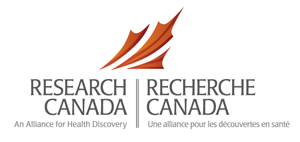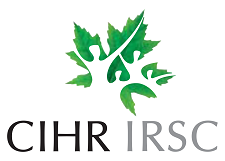COVID-19: The Health Research and Innovation Community’s Role in a Pandemic

COVID-19 Health Research and Innovation
♦ Northern light: How Canadian research offers hope in the fight against COVID-19
Canadian Institutes of Health Research (CIHR)
The past few months have alternatively felt years long and like the blink of an eye, and while progress has certainly been made, there are no easy fixes. The COVID-19 pandemic—both here in Canada and around the globe—is not just one thing. We need medical countermeasures to diagnose, treat, and track the disease, but we also need social and policy countermeasures to reduce the spread and help people make healthy choices. We need to fight fear and misinformation, protect the vulnerable, and determine the safest ways to re-open and operate schools and workplaces. And we need the best evidence possible—as soon as possible—to do it all.
This is a tall order to be sure, but Canada is home to exceptional people working in all areas of health research—and many of them are now directing their expertise to the messy but vital work of figuring out what we should do next.
Featuring CIHR-funded researchers from:
University—Rosedale (ON) | University Health Network
Vancouver Granville (BC) | BC Centre for Disease Control
Vancouver Quadra (BC) | University of British Columbia
Burnaby North—Seymour (BC) | Simon Fraser University
Edmonton Strathcona (AB) | University of Alberta
COVID-19 Research
♦ London, Ont., researchers the first to profile immune response to COVID-19
London North Centre (ON) | Lawson Health Research Institute & Western University
“That inflammation that occurs is important for ridding the body of the virus, but the flip-side of that is if it’s exaggerated, the inflammation can actually start to destroy your own tissues,” lead researcher Dr. Douglas Fraser explained.
♦ CT scan technology may detect unknowing carriers of COVID-19, says Ottawa Heart Institute
Ottawa Centre (ON) | University of Ottawa Heart Institute
“We’re increasingly finding quite a proportion of people who test positive for COVID-19 are asymptomatic,” says Crean. “We need to know who these people are – the concern being people who feel well may be presenting to the hospital as unknowing carriers and transmitters of disease.”
 ♦ Mind the (data) gap: Filling in the blanks during a pandemic
♦ Mind the (data) gap: Filling in the blanks during a pandemic
University—Rosedale (ON) | Lunenfeld-Tanenbaum Research Institute at Sinai Health
When any virus makes people sick, we tend to ask the same questions: How contagious is it? How does one person infect another? And for how long could they spread it to others? We need quality, reliable information about how the virus spreads.
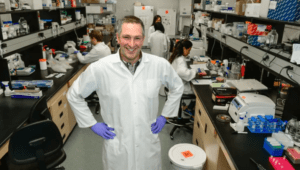 ♦ How a lab in Saskatchewan that focuses on animals became Canada’s $23M hope for a COVID-19 vaccine
♦ How a lab in Saskatchewan that focuses on animals became Canada’s $23M hope for a COVID-19 vaccine
Saskatoon—University (SK)| University of Saskatchewan & VIDO-InterVac
Today, the vaccine centre is one of only a few high-level containment facilities in the world able to conduct research on a vaccine for COVID-19.
♦ I study viruses: How our team isolated the new coronavirus to fight the global pandemic
Hamilton West—Ancaster—Dundas (ON) | McMaster University
As most people rush to distance themselves from COVID-19, Canadian researchers have been waiting eagerly to get their (gloved) hands on the hated virus.
♦ How the first Canadian COVID-19 vaccine trial will work
Halifax (NS) | Dalhousie University
“Under normal conditions, those types of studies … can take five to seven years. It’s a very long process,” said Dr. Scott Halperin.
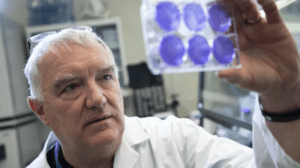 ♦ Cancer researchers hoping ‘Trojan Horse’ virus key to COVID-19 vaccines
♦ Cancer researchers hoping ‘Trojan Horse’ virus key to COVID-19 vaccines
Ottawa South (ON) | Ottawa Hospital Research Institute & BioCanRx
Researchers in Ottawa are now part of the worldwide race to develop a vaccine for COVID-19, and they’re using what they’ve learned on their hunt for a cancer cure as their road map.
♦ Hydroxychloroquine not effective in preventing the development of COVID-19 when used as post-exposure prophylaxis
Ville-Marie—Le Sud-Ouest—Île-des-Soeurs (QC) | Research Institute of the McGill University Health Centre (RI-MUHC)
Winnipeg Centre (MB) | University of Manitoba
Edmonton Strathcona (AB) | University of Alberta
‘’Our study’s results set politics aside and provide unbiased evidence to guide practice in the prevention of COVID-19 and reinforce the importance of randomized clinical trials as we work together nationally and internationally to combat the novel coronavirus.”
♦ Respiratory therapists may be the ‘best kept secret’ in the fight against coronavirus
Halifax (NS) | IWK Health Centre
Alana Spicer has worked as a respiratory therapist at the IWK Health Centre in Halifax for more than 20 years. In all of her career, she’s never seen anything as intense as the novel coronavirus pandemic.
♦ Stem Cell Network announces $675,000 for three Canadian-led COVID-19 Research Projects
Ottawa South (ON) | Stem Cell Network & Ottawa Hospital Research Institute
University—Rosedale (ON) | Hospital for Sick Children (SickKids)
Canada’s national leader in stem cell and regenerative medicine research announced the funding of three new projects led by researchers at the Ottawa Hospital Research Institute (OHRI) and SickKids Hospital in Toronto that will contribute to the global response to COVID-19.
Collaboration with Canada’s Health and Biosciences Sector
♦ COVID-19: How AstraZeneca Canada is responding to COVID-19, including supplying medicines, participating in clinical trials and facilitating patient support programs.
♦ Innovative Medicines Canada’s (IMC) COVID-19 Resource Centre: Information on IMC members’ contributions to treating and eradicating COVID-19 as well as important resources and links
♦ Collaborating to accelerate COVID-19 research: See how STEMCELL Technologies is helping scientists advance their search for effective interventions
♦ Unprecedented collaboration: Will the way we work together be forever changes for the better? Medtronic Canada’s Neil Fraser takes a look at the “silver lining in these challenging times.”
♦ Meet the experts: IMC’s members are making important collaborative contributions to COVID-19 vaccine and treatment R&D
Dr. Dion Neame | Vimy (QC) | Sanofi Canada
Dr. Alex Romanovschi | Mississauga—Streetsville (ON) | GSK Canada
Vatche Bartekian | Saint-Laurent (QC) | Vantage BioTrials
 ♦ Promising treatments for COVID-19 by Canadian scientists
♦ Promising treatments for COVID-19 by Canadian scientists
Ottawa Centre (ON) | Innovative Medicines Canada
Toronto—St. Paul’s (ON) | PlantForm Corp.
University—Rosedale (ON) | University of Toronto
Vimy (QC) | Sanofi Canada
When most people think of Canadian medical innovation, the first thing that typically comes to mind is insulin. And while Banting and Best’s discovery was a breakthrough in the treatment of diabetes, it also took place almost a century ago.
 ♦ Rapid vaccine development in the war against the novel coronavirus
♦ Rapid vaccine development in the war against the novel coronavirus
Lac-Saint-Louis (QC) | Pfizer
Given the urgent crisis, it’s clear that a vaccine cannot be developed soon enough to help stem the pandemic. With the goal of accomplishing what in normal times would have been deemed impossible, we are engaging collaboratively with regulatory authorities to adapt traditional vaccine research and development to meet this unprecedented challenge.
Society and COVID-19
♦ The ethics of a pandemic
Laurier—Sainte-Marie (QC) |
Montreal Clinical Research Institute
While the current pandemic presents enormous ethical challenges, there are also opportunities to help guide and develop newer, more informed policies and criteria for decision-making.
♦ Pandemic may lead women to neglect their reproductive health care
Vancouver Granville (BC) | Vancouver Coastal Health Research Institute
Vancouver Quadra (BC) | UBC
“The message should be loud and clear that critical screening practices absolutely should continue,” said Dr. Lori Brotto, a psychotherapist and the director of the UBC Sexual Health Laboratory in Vancouver.
♦ Now you’re speaking my language! COVID-19 risk communications for First Nations people by First Nations people
Winnipeg South (MB) | University of Manitoba
Churchill—Keewatinook (MB) | University College of the North
The COVID-19 pandemic may be dominating the headlines in mainstream media, but it would be unwise to assume that messages about infection risks and public health measures are reaching all audiences equally.
♦ More than a health crisis: Exploring Chinese stigma and the social impacts of COVID-19
Humber River—Black Creek (ON) | York University
The spread of misinformation and fear that accompanies the spread of illness during a pandemic can have negative social impacts. In the context of COVID-19, among these negative social impacts is anti-Chinese sentiment (i.e., Sinophobia) towards ethnically Chinese communities.
♦ Accessibility on the Fringes in a Time of Crisis
Ottawa Centre (ON) | Carleton University and the Federation for the Humanities and Social Sciences
In their communications recognizing the need to ensure the health, safety and security of members of the university community, administrators around the COVID-19 crisis have by and large overlooked two of our most vulnerable populations: those with disabilities and the elderly (i.e. retirees).
♦ How COVID-19 has pushed health care into the virtual world, helping patients get treated at home
University—Rosedale (ON) | University Health Network
Dr. Barry Rubin, the medical director at Toronto’s Peter Munk Cardiac Centre, says the novel coronavirus has forced clinicians to make virtual care a much bigger part of treating patients. In fact, he says, the pandemic has brought about changes in just a few weeks that have eluded health-care professionals for decades.
Heath Charities as Research Partners
♦ Health charities are facing new funding challenges during the COVID-19 pandemic, and the entire health innovation ecosystem is feeling its effects
Health charities are critical partners to Canada’s health innovation ecosystem, working alongside other funders to fill essential funding gaps, offer stable funding and promote patient centred research and foster relationships with patient communities. The members of the Health Charities Coalition of Canada alone contribute over $155 million annually towards Canadian health research and research training and support over 1,300 primary investigators and over 2,500 trainees, co-investigators, chairs and professorships.
Unfortunately, COVID-19 has brought about significant challenges for health charities that are greatly impacting their ability to support Canadian health research for the patients which they serve. In addition to an increased need for services from patient communities, health charities are also seeing substantial losses in revenue as a result of the cancellation of fundraising events and the strained economic situations of many typical donors. This means that health charities are not able to maintain their essential research operations or support the research staff which make these life-saving research projects possible.
That is why over 1,000 researchers from across Canada recently signed a letter to the Prime Minister asking for support for health charities and the health researchers with whom they are essential partners. Read the letter on HCCC’s website.
Testing and Contact Tracing
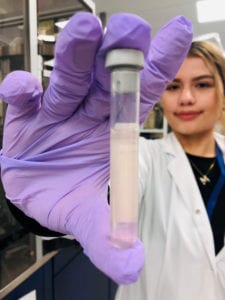 ♦ Laboratory workers are essential workers — and not just during a pandemic
♦ Laboratory workers are essential workers — and not just during a pandemic
Hamilton Centre (ON) | Canadian Society for Medical Laboratory Science
London North Centre (ON) | Western University
“We’re there before you’re born, up to your last breath. Techs are involved in anything from prenatal screening, diabetes, to cancer. We don’t just collect your blood,” said Christine Nielsen, CEO of CSMLS.
♦ WATCH: What happens to a COVID-19 test?
Halifax (NS) | Nova Scotia Health Authority
Charles Heinstein, technical manager of Microbiology at Nova Scotia Health Authority gives a behind-the-scenes look at what happens to the samples collected from COVID-19 tests.
♦ Queen’s-KHSC team develop in-house COVID-19 test
Kingston and the Islands (ON) | Kingston Health Sciences Centre & Queen’s University
Testing is key to managing the coronavirus pandemic. Yet the costs of testing, the volume of people needing to be tested versus availability of tests, and waiting time for results, have challenged health care systems worldwide.
♦ University of Calgary medical students quadruple province’s COVID-19 contact-tracing capacity
Calgary Confederation (AB) | University of Calgary
University of Calgary medical students and residents are helping fight the spread of COVID-19 on the front lines, and with their help the province has quadrupled its contact-tracing capacity.
Support for the Front Lines
♦ Michener-led team readies redeployed workers to provide COVID-19 care
University—Rosedale (ON) | Michener Institute of Education at UHN
With the rapid rise and severity of COVID-19 cases, hospitals were concerned that they would urgently need healthcare professionals to redeploy to critical care environments. To enable this redeployment, a team led by the Michener Institute of Education at UHN worked with experts from across the Toronto Region to create an online education package to ensure healthcare workers have the information they need to safely care for COVID-19 and other critically ill patients.
 ♦ Nurses are at work while most of us are at home – let’s support them
♦ Nurses are at work while most of us are at home – let’s support them
Ottawa Centre (ON) | Canadian Nurses Foundation
No group of workers is more essential in these times than our frontline healthcare workers, especially our nurses. That is why we must support them.
♦ University of Alberta works with AHS to make 3D-printed face shields
Edmonton Centre (AB) | Alberta Health Services
Edmonton Strathcona (AB) | University of Alberta
The group behind the project is made up of clinicians, engineers and designers working alongside Alberta Health Services to make 2,000 face shields that are reusable and safe. The U of A said they have received Health Canada’s approval to manufacture the shields.
Mental Health Initiatives
Information and Resources
♦ Coping with Stress, Anxiety and Substance Use During COVID-19: An infographic from the Canadian Centre on Substance Use and Addiction and the Mental Health Commission of Canada
♦ Caring for your mental health during COVID-19: Resources from the Mood Disorders Society of Canada
♦ Mental health and the COVID-19 pandemic: Resources from the Centre for Addiction and Mental Health (CAMH)
♦ Trust, creativity and safety key to transitioning adolescent patients to virtual health
Vancouver Centre (BC) | Provincial Health Services Authority
Vancouver Granville (BC) | BC Children’s Hospital
What does it take to effectively transition patients to Virtual Health? Trust, creativity and safety, says Kim Williams, clinical operations manager with Looking Glass Residence, a mental health program at BC Children’s Hospital. They are the same building blocks for effective treatment that Kim and her team work hard to build and maintain every day.
In the News
♦ How are kids affected by COVID-19?
Calgary Confederation (AB) | Alberta Children’s Hospital & University of Calgary
While it is clear that COVID-19 infection can have severe impacts on older adults and those with pre-existing respiratory and other conditions, little is known so far about how the virus impacts children. One of CIHR’s 99 recently funded Novel Coronavirus (COVID-19) Rapid Research projects aims to change that.
♦ COVID-19 Q&As : Rachel Rabin on coping with addiction during the pandemic
Lac-Saint-Louis (QC) | Douglas Research Centre
The COVID-19 pandemic is a challenging time for everyone. This new normal, and all the uncertainty that comes with it may elicit feelings of stress, depression, loneliness, anger and anxiety … which are prominent risk factors for the onset and maintenance of addiction.
♦ Laurier researchers studying mental health impacts of COVID-19 outbreak on Canadian workers
Waterloo (ON) | Wilfrid Laurier University
As Canadians implement social distancing measures to minimize the spread of the novel coronavirus (COVID-19), researchers at Wilfrid Laurier University are studying the effects of social isolation on Canadian workers in real time.
♦ COVID-19’s impact on mental health and returning to the workplace
Ottawa South (ON)| The Conference Board of Canada
Many changes and challenges have come about because of COVID-19. And while we are still discovering the considerable impact this virus can have on physical health, there is as much to learn about its impact on mental health.
Vulnerable Populations
Information and Resources
♦ COVID-19 Update: Information and resources from the ALS Society of Canada
♦ Coronavirus and the Immunocompromised: Resources and information from the Canadian Digestive Health Foundation
♦ Coronavirus and Type 1 Diabetes: What You Need to Know: Information and resources from JDRF
♦ Online Virtual Programs: March of Dimes Canada has shifted many of their Community and After Stroke programs to online and telephone platforms
♦ COVID-19 and Multiple Myeloma: What You Need to Know: Educational webinar from Myeloma Canada
♦ Your Bone Health During COVID-19: Information from Osteoporosis Canada to help Canadians manage their bone health and osteoporosis
♦ Parkinson Canada’s Action Plan for COVID-19
In the News
♦ COVID-19 response shows viability, challenges of First Nation sovereignty
Sudbury (ON) | Laurentian University
Faced with the threat of COVID-19, First Nations leaders took innovative, autonomous steps for the protection of their people, resources, and histories, say Laurentian University researchers and associated community leaders.
♦ Pancreatic cancer care in the age of physical distancing
Eglinton—Lawrence (ON) | Pancreatic Cancer Canada
The advent of physical distancing measures has led to many questions from our pancreatic cancer community – from whether you can still get a second opinion to whether patients should continue with their treatment plans. We spoke with Pancreatic Cancer Canada’s research liaison, Anna Dodd, about how pancreatic cancer healthcare teams are providing patient care during this uncertain time.
♦ People with disabilities, autism carry a heavier pandemic burden, advocates say
Don Valley West (ON) | March of Dimes Canada
Even before the COVID-19 outbreak, people with disabilities were facing “significant” challenges every day, March of Dimes Canada president Len Baker previously told Global News. “Those historic barriers become exacerbated during a time such as this pandemic,” he said.
♦ Seniors wit h frailty will be hardest hit by COVID-19
h frailty will be hardest hit by COVID-19
Kingston and the Islands (ON) | Canadian Frailty Network
As the Prime Minister addressed the nation, he echoed what public health officials have been saying: Listen to your health care providers, practise social distancing and get prepared.
♦ Lessons from a life with Crohn’s
Toronto—St. Paul’s (ON) | Crohn’s and Colitis Canada
Nurses, doctors and surgeons … have cared for me and nursed me back to health more times, than I can count. While most of the world is just recognizing their sacrifices now in this pandemic, they have always been heroes in my world.
